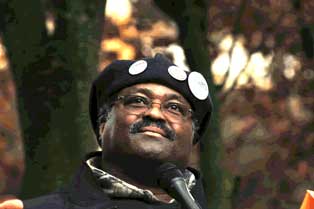
Leonard Fearn is a hospital administrator and the president of the American Federation of Government Employees Local 2157. He spoke with The Skanner News about why a career in government service is a good idea, and what his union does to give each member the best opportunities possible.
The Skanner News: Your job seems complicated. Can you describe it?
Leonard Fearn : I'm a medical administrative specialist out of the emergency room, what we call it is an administrative officer. I'm on duty between 6 p.m. and 6 a.m. – during those hours we become the senior administrator of the hospital. So we attempt to coordinate our efforts administratively across the hospital, insuring that our veteran clients receive the appropriate allotment of travel arrangements as well as care and treatment, scheduling and things like that.
TSN: Talk about the AFGE. I think a lot of people don't know you exist.
LF: That's probably more true than not. The American Federation of Government Employees has been around since 1932, and is actually a consolidation of 42 federal agencies. The AFGE is a national organization with 12 distinct districts throughout the country — we have facilities in Guam, in Puerto Rico. So we're out there and we essentially provide our services to represent government employees, the fulltime and part time workforce that is professional and nonprofessional employees in various agencies like the department of veterans affairs, social security administration, department of justice, department of defense, transportation and safety administration, food and drug administration, bureau of prisons, the integration offices – there's a couple more to the list..
TSN: I think a lot of people today don't really know what occupations are unionized. Talk about what your union brings to a federal job – what's good about it?
LF: We certainly advocate for pride and professionalism in the workplace, giving security to the bargaining unit, gives them the opportunity to further advance themselves through continuing education or and what may very well be self-study; we maintain an effective relationship with management as a way of ensuring that a bridge or a what may very well be needed communications about a sensitive subject – or a variety of subjects – are covered.
Also what is a plus is that being a federal employee they could actually consider transferring to other parts of the country because, if there's similar work and responsibilities and jobs there, that's something they can do.
We have a way of resolving our issues through a grievance procedure or third-party intervention.
It gives you flexibility as a worker, but there are also safeguards in case you encounter problems in the job. It gives you a few more rights, a little more power to make sure you can resolve conflicts.
TSN: If you could speak directly to young people and other people who are looking for a career, what would you say to them about your union?
LF: I'd tell them — look to health care. Health care is going to be around – we hope forever, unless they come out with some automated system with some miracle cure. Taking care of people that are incapacitated, having surgeries, rehabilitating them – all of this is something that we really need in our society today. We need those individuals who have not only the talent of administrative skills, but the talent and initiative to actually acknowledge and comfort those who are going through the struggles or rehabilitation. The idea that we all serve in the VA – we serve a very unique group of individuals who not only need our care, but sometimes have a violent response to it. So conditioning ourselves to understand how to try and reduce the risk not only to ourselves but also gaining their confidence so they can make that transition back to and continue reintegrating themselves into civilian life.
TSN: What is the most important thing for our readers to know about union jobs and the AFGE?
LF: We would like to see a larger group of minorities take an interest in health care. Not only would that be useful in treating those individuals that are currently here, it would also give the community an opportunity to have a direct link to individuals that they can relate to. The many sectors of the VA, they do have their disparities in terms of diversity and there's a variety of individuals that I have as clients here — meaning patients — that simply respond a little bit better or differently to their care and treatment when they are served by someone who relates to them. So we try to cover those bases as well. And having individuals who may speak other languages – this country is a melting pot. The participation in support and security of this country is growing from the Hispanic, the Asian, the African American cultures — we still need to have that diverse work group with that familiar face or smile to calm these individuals down and make them adaptable to care.
- Home
- News
- Opinion
- Entertainment
- Classified
- About Us
 MLK Breakfast
MLK Breakfast- Community
- Foundation
- Obituaries
- Donate
04-24-2024 9:20 pm • PDX and SEA Weather










